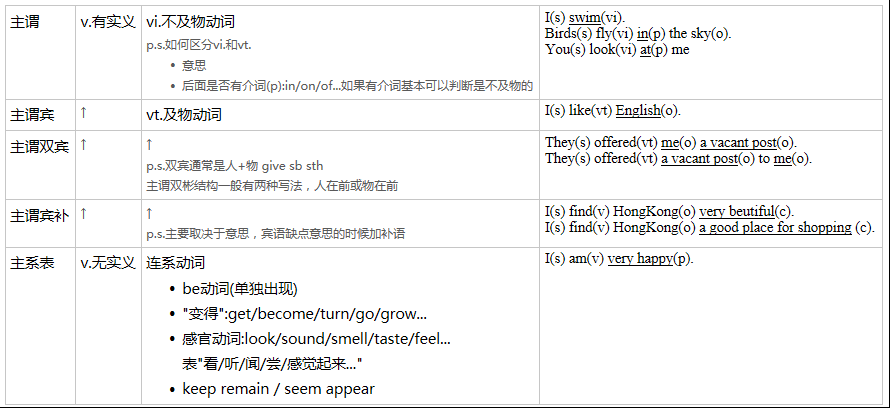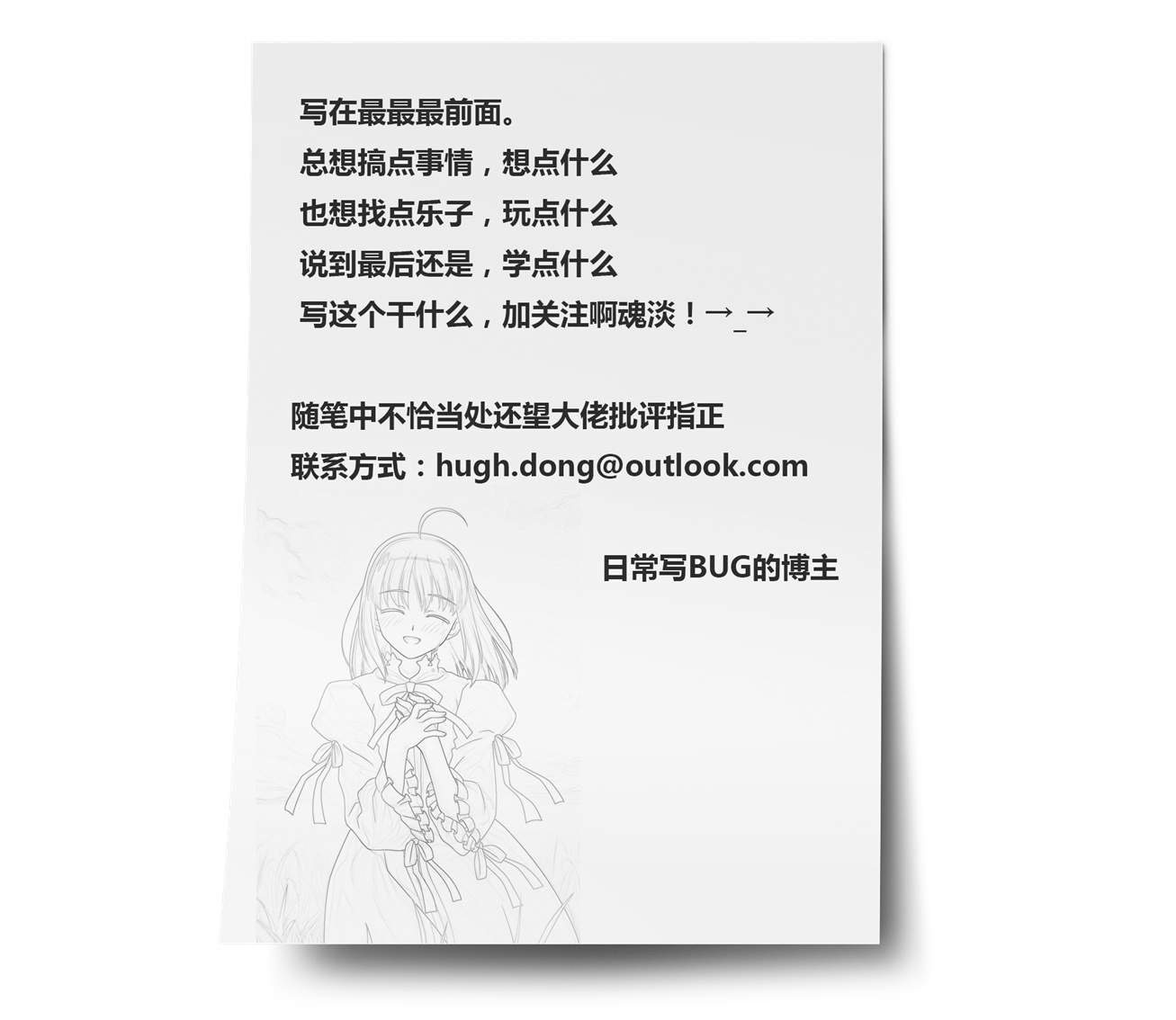————————————————————————————————————————————
简单句
基本构成:n+v,一个主语搭配一个谓语
- - - - - - - - - - - - - - - - - - - - - - - - - - - - - - - - - - - - - - - - - - - - - - - - - - - - - - - - - - - - - - - - - - - - - - - - - -
核心构成:由谓语动词决定

p.s.
主 subject(s)
谓 predicate(v)
宾 object(o)
定 attributive(attrib)
补 complement(c)
状语 adverbial
表语 predicative(p)
- - - - - - - - - - - - - - - - - - - - - - - - - - - - - - - - - - - - - - - - - - - - - - - - - - - - - - - - - - - - - - - - - - - - - - - - - -
时态:

p.s.
-
过去式和过去分词的区别
过去式用在一般过去时,过去分词用在完成时、被动语态(be+done)中,过去分词可以不作谓语。
-
变成三单主要是为了和主语相搭配,如果主语是三单则v.也要变成三单,be动词和情态动词没有三单。
三单的主语有:
- he/she/it
- 可数名词单数
- 不可数名词
- - - - - - - - - - - - - - - - - - - - - - - - - - - - - - - - - - - - - - - - - - - - - - - - - - - - - - - - - - - - - - - - - - - - - - - - - -
语态:
主动语态:略
被动语态:符合逻辑思维,客观作为主体。
- 公式:be done ,be表示被动的时间和单复数,done表示被动的动作
- 要求:vt.+o. / vi.+p.+o. 要有宾语
- 例:狗吃了那个蛋糕 → 蛋糕被狗吃了
- 例:Classrooms are clearned every day. 教室每天都被打扫。
- 例:A new building was built last year. 一座新的大楼去年建造的。
-
例:
- 他每天被打 He is beaten every day.
- 他昨天被打了 He was beaten last day.
- 他明天将要被打 He will be beaten tomorrow
- 他现在正在被打 He is being beaten.
- 他现在已经被打了 He has been beaten.
- - - - - - - - - - - - - - - - - - - - - - - - - - - - - - - - - - - - - - - - - - - - - - - - - - - - - - - - - - - - - - - - - - - - - - - - - -
情态:表达情绪的态度
- 公式:情态动词+动词原形(如 may be),情态动词没有人称变化,时态变化有限(只有一般现在时/一般过去时)
-
常用情态:

p.s.
-
- could would should might 特殊用法:1.可以表达过去 2.可以表达现在的(更委婉的语气)
- 每一个情态动词都能表推测
- 情态动词 + have done/be doing/...,强调对当下时态表情态
- - - - - - - - - - - - - - - - - - - - - - - - - - - - - - - - - - - - - - - - - - - - - - - - - - - - - - - - - - - - - - - - - - - - - - - - - -
主语/宾语/表语的变化:
- 名词或代词:They gave us a good impression.
-
doing / to do 可以作为名词来用,此时就可以作为s.o.c.来用
-
作为主语:
-
Laugthing probably has great influence on health. 变成动名词作主语
To laugth probably has great influence on health. 也可以用to do来作主语
It probably has great influence on health to laugh. 形式主语放在句首,to do置后
-
长串词组作为主语
Having only a foggy view of the future is of little good.
It is no use to talk about dreams without trying.
-
-
作为宾语:
- We enjoy reading books in the library.
-
作为表语:
- Our main goal is to finish the task on time.
-
多个主宾表语并列:
- 并列主语:Science and technology will develop the process of society.
- 并列宾语:Social science disciplines include geography,economics,political science,and psychology.
- 并列表语:That doesn't mean sitting down and doing nothing at all.
- - - - - - - - - - - - - - - - - - - - - - - - - - - - - - - - - - - - - - - - - - - - - - - - - - - - - - - - - - - - - - - - - - - - - - - - - -
简单句的补充:
-
限定词
- 冠词:a/an/the
- 数词:thousand/a lot of
- 形容词副词
-
介词短语:表示时间地点方式...
-
主要形式
- p.+名词
- p.+代词
- p.+动名词
-
常用的:
- in/on/at
- from/to
- into/onto
- with/without
-
of
- 表示属性
-
by
- 通过xx方式方法
- 被动语态+by,表示被谁xx
- stand+by,表示在旁边
- by+时间,表示截止到xx时候
- 表示差额
- for
- about
-
不常用的:
- before/after
- since/until
- during
- between/among
- across/through
- against
- like/as
-
-
举例:
Girls play games. 女孩玩游戏
Girls are playing games. 女孩正在玩游戏
Lovely girls are playing games happily. 可爱的女孩正在高兴的玩游戏
Thousands of lovely girls are playing games very happily. 几千个可爱的女孩正在非常高兴的玩游戏
After class thousands of Lovely girls are playing games very happily on the playground. 几千个可爱的女孩课后在操场上非常高兴的玩游戏
写句子的过程就是要扩展核心内容,而读句子时(比如长难句)就是要逆过来,得到最核心的内容。
-
非谓语动词:谓语之外的动词都是非谓语东西,修饰名词或整个句子,及物动词的话非谓语动词是词组
-
doing 主动
- 修饰名词:Passing planes can be heard night and day. 白天和晚上可以听到经过的飞机。heard是谓语,飞机是主动经过的,所以是Passing
- 修饰句子:The teacher came into the classroom,holding a book in his hand. 拿着书的老师进入教室。书是主动拿着的
-
done 被动
- 修饰名词:He bought a used car. 他买了一个被用过的车
- 修饰句子:The teacher came into the classroom,followed by five students. 老师被五个学生跟着。
-
to do 目的
- 修饰名词:I am coming to see you. 我来看你。
- 修饰句子:I have a lot of homework to do. 当todo修饰整句话时不用逗号隔开
-
-
同位语/插入语:有补充说明的成分,通常在两个逗号/破折号之间
- 同位语:My teacher,Mr.Lee,is coming to the meeting. 对前面名词的补充说明,说的是同一个东西
- 插入语:My teacher,together with his colleagues,is coming to the meeting. 和前后都没有关系
————————————————————————————————————————————
